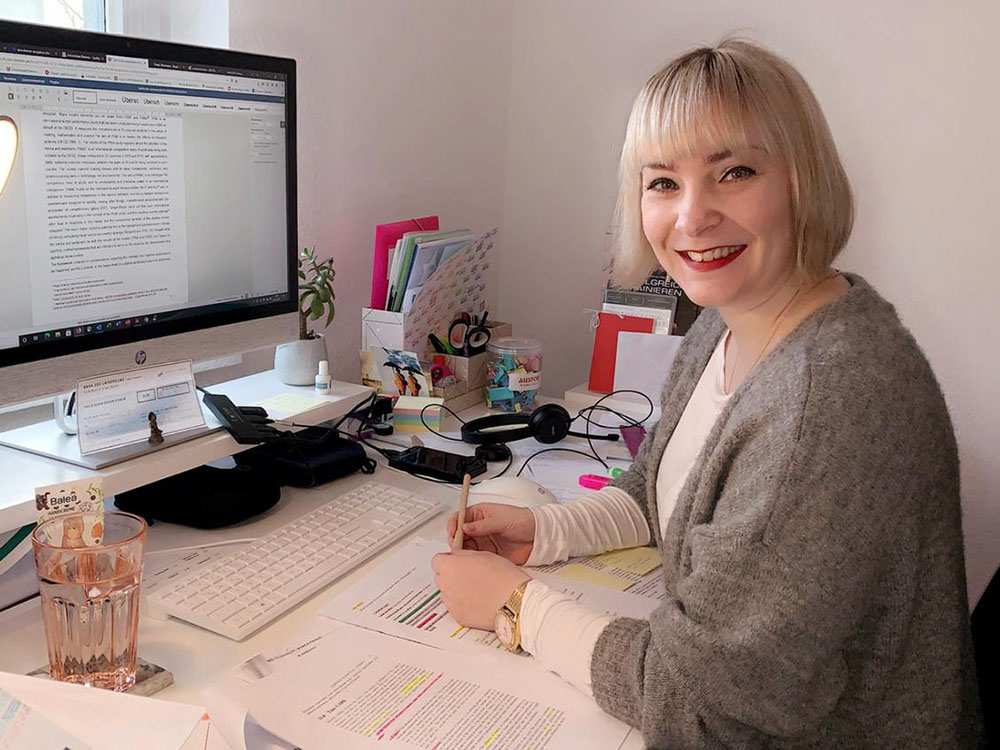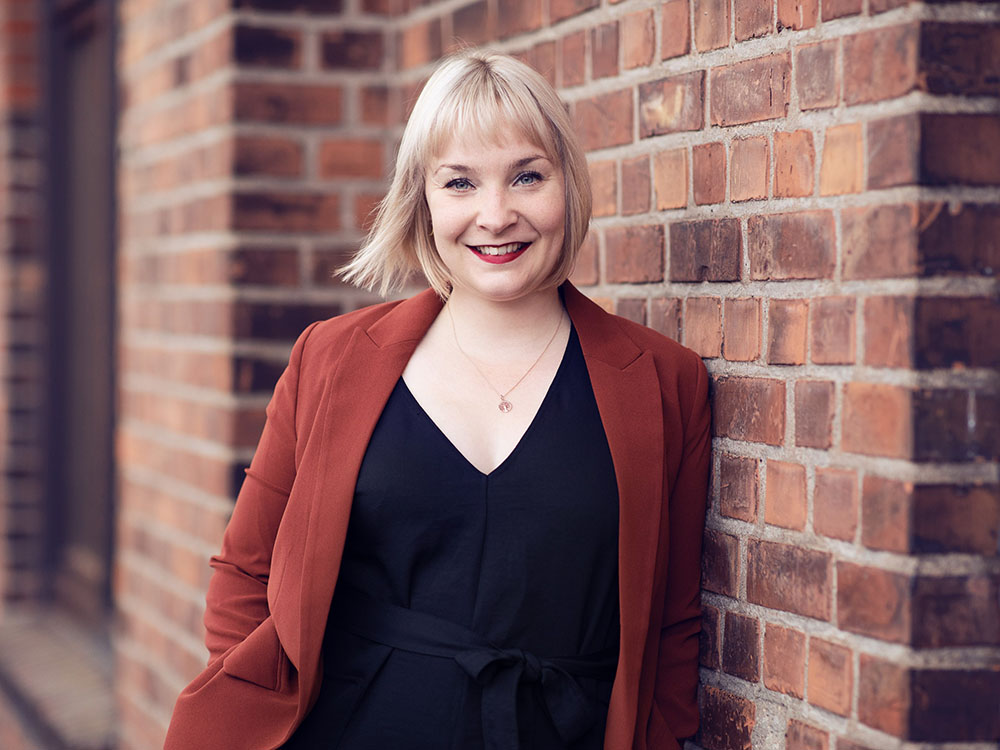
© Julia Sulzbach
Career with “Statistics in Court”
The academic mid-level sector in focus: Dr. Tanja Ihden from the Faculty of Business Studies & Economics
She is a business economist but at the moment she’s more interested in legal matters – and everything in-between: Dr. Tanja Ihden from the Faculty of Business Studies & Economics has found a very niche research topic. Statistics form the core as an aid in decision-making in court proceedings. Statistics in Court is the name of the project that she is working on as part of the Professorship in Empirical Economics and Applied Statistics held by Martin Missong.
Statistics: One of the things that nearly every student has to face at some point. It is a tiresome obligation for many as a part of the curriculum – for some it is even a nuisance. “I had great respect for it during my business studies degree. I definitely didn’t want to fail the statistics exam. That led to me working even harder on it,” remembers Dr. Tanja Ihden. It was not foreseeable at that point that the work on numbers and scales would become an interesting research topic. Today, the 32-year-old is on the way to becoming an expert on statistics in court.

© Steffen Baack
Math actually wasn’t the favorite school subject of the researcher who grew up in Neubrandenburg and came to the University of Bremen to study. “I never thought that business studies would have so much to do with numbers. But during my degree, there were eureka moments. By working on mathematics and statistics, I actually learnt for the first time what the point of the 1. derivative is.” However, she still wrote her bachelor’s thesis on a “traditional” topic in 2011 – the German-Russian economic relations.
She subsequently consciously chose to do her master’s degree in the newly founded Professional Public Decision Making degree program. The course seemed to be made for her: “It was new, I was able to do pioneering work there, it is an interdisciplinary degree program. I love taking a look at different points of view and then connecting them.” She linked political, legal, and economic perspectives in her master’s thesis on the Eurozone crisis, which was taking place at the time.
“Would You Have Been Able to Say No?”
In 2011, Tanja Ihden also started to work as a student assistant for the economics professor Martin Missong. They got on well and suddenly there was an opportunity available for the period after her studies. She laughs when she thinks back on how coincidences, opportunities, and contacts suddenly opened the door to an academic career: “I actually wanted to be independent after my master’s and leave Bremen but Professor Missong got me interested in the planned Statistics in Court project in his team. At the time, he told me that he only knew of one person who could successfully bring life into the project: me. Would you have been able to say no?”
“Statistics is not a ‘justice machine’, to put it plainly.”
Statistics in Court became a research unit within the Faculty of Business Studies & Economics and formed the core of Tanja Ihden’s work. The Relevance of Statistical Methods in Law and Possible Implications for Legal Training (“Die Relevanz statistischer Methoden in der Rechtsprechung und mögliche Implikationen für die juristische Ausbildung”) was the title of her dissertation that she completed in 2017. “Statistics is not only for data analysis, but is also a decision-making aid on many levels,” she explains. “Justice is not administered based on gut feelings, but rather facts. And there are statistical probabilities – for example if a statement from the prosecutor or defendant could be correct or not.” However, it must be noted that this probability is only one of many pieces of the puzzle in court: “Statistics is not a ‘justice machine’, to put it plainly.”
In Anglo-American regions, statistics already play a key role in court. Decisions that are supported by probabilities are made more often there than here – this is also the case because they look at comparable cases and experiences in the past years more. In Germany, individual case decisions carry more significance, explains Tanja Ihden. That is why a close cooperation with the field of law is necessary. “Statistics still play a very small role in court here. I don’t want to say that I am the first to work on this but I am certainly one of only a few.”
12 Percent Insufficient for Preventive Detention
In Germany, there have been legal rulings in which numbers played a role. For example, a rapist in Hamburg was able to avoid preventive detention after his imprisonment, as a report stated the probability of a sex crime relapse as being 12 percent –which was “insufficient for preventive detention” in the court’s opinion. During proceedings at an administrative court on the other hand, Bremerhaven town filed a complaint against the projection of the population size being based on random sampling – instead of a comprehensive census. The town lost: The court deemed the collection of numbers as sufficient for a projection.
“We definitely don’t want to overwhelm the students with horrible formulas.”
As a post-doctoral researcher, Tanja Ihden is now the head of the research unit that is funded by Professor Missong’s budget. Outside of teaching hours – “thus, in our free time” – she and Missong hold the weekly two-hour key skills course Statistics in Court in the Faculty of Law. “We are trying to communicate the topic as clearly as possible. We definitely don’t want to overwhelm the students with horrible formulas.” In times of corona, the statistics expert is holding the class digitally – “Monday morning at 8 a.m. in front of 400 people.”

© Julia Sulzbach
Going Separate Ways at the End of 2021
Tanja Ihden has been in Martin Missong’s team for nearly ten years now. “The next step always seemed to appear, which was great – especially as the work atmosphere within the group is fantastic.” At the end of 2021, her current contract will end and they will go their separate ways; “I have thrown my hat into the ring for several advertised assistant professorship jobs and want to find out what chance I have,” is what she says when talking about her career plans. The “Bremen Uni system,” in which she also works as a gender equality commissioner, is something that she “has come to understand quite well. Now I want to go out into the world and see what it is like elsewhere.”